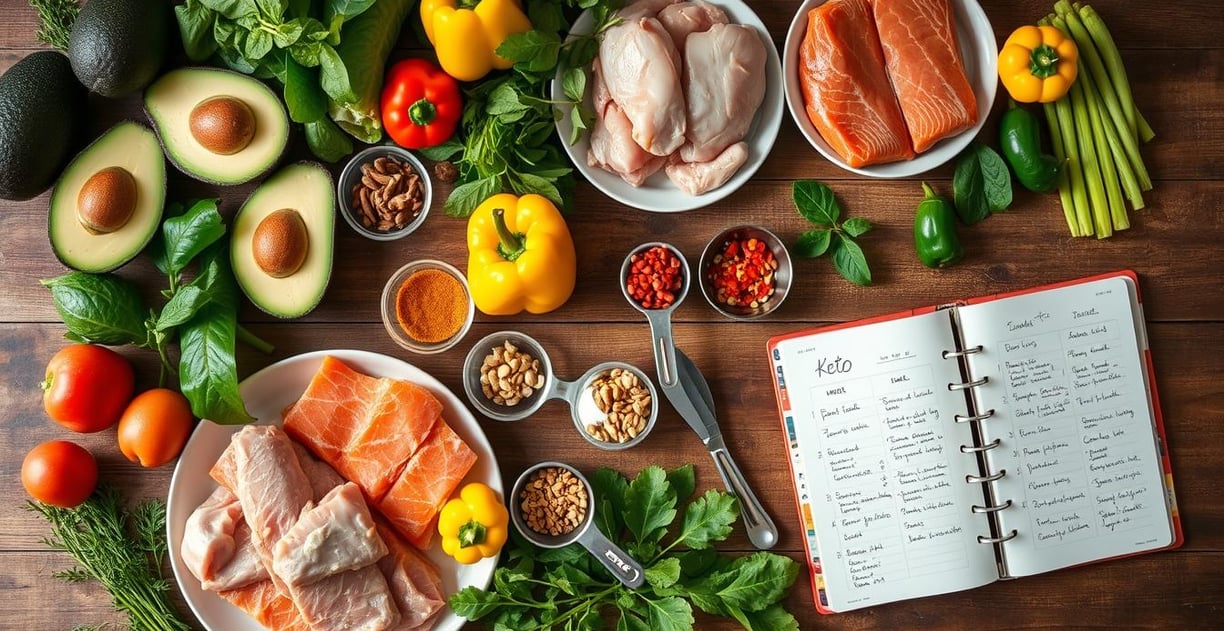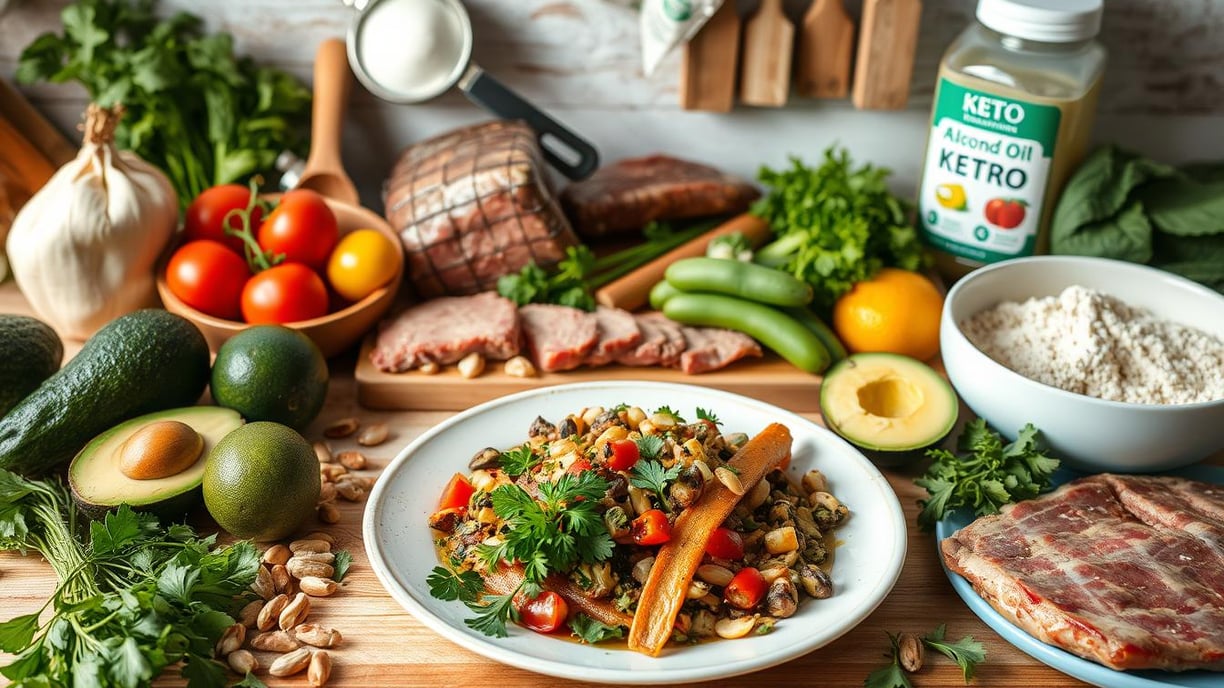Simple Guides Tip and Recipes to Easily Start the Keto Diet including Explanations
Starting a ketogenic diet might seem hard, but this guide makes it easy. It helps you switch to a diet rich in fats and low in carbs. This change can improve your health, help you lose weight, or just explore the keto diet's benefits. This guide will teach you everything from what ketosis is to tasty keto recipes. It's packed with tips to help you start your keto journey with ease. Get ready to discover how the ketogenic diet can help you reach your goals.
BLOG
12/21/20248 min read


Key Takeaways
Gain a deeper understanding of the ketogenic diet and its core principles
Discover the science behind ketosis and its impact on your body
Explore the numerous health benefits associated with a keto lifestyle
Learn how to create a personalized keto plan that fits your unique needs
Access a wealth of delicious keto-friendly recipes to jumpstart your journey
Understanding the Basics of Ketogenic Diet
The ketogenic diet is a low-carb, high-fat eating plan that has become very popular. It focuses on ketosis, where your body uses fat for energy instead of carbs. This change can improve your energy and health.
What Happens to Your Body in Ketosis
When you cut down on carbs, your body goes into ketosis. This leads to several changes, including:
More fat is burned for energy
Less insulin, helping with healthy fats storage
Ketones are made, giving your brain and organs an alternative fuel
Key Benefits of Going Keto
Going keto can bring many benefits, such as:
Long-term keto weight loss and better body shape
Better mental focus and brain function
Stable blood sugar and lower risk of type 2 diabetes
More energy and less tiredness
Common Misconceptions About Keto
Despite its popularity, keto is often misunderstood. Some common myths include:
Keto is unhealthy and not sustainable
Keto is only for losing weight, not for health
Ketosis explained is dangerous
Keto is too strict with no flexibility
Actually, the ketogenic diet can be safe and beneficial for health when done right.
"The ketogenic diet is a powerful tool for improving health, but it's important to understand the science behind it and dispel common myths."
Keto for Beginners: Getting Started
Starting a keto lifestyle might seem hard at first. But with the right help, it can be rewarding and easy to keep up. Here's a simple guide to help keto for beginners start their journey to ketosis.
Calculate Your Macronutrient Needs
Knowing your macronutrient needs is key to a good ketogenic diet. Use online tools or talk to a nutritionist. They can help you find the right mix of fats, proteins, and carbs for ketosis.
Prepare Your Kitchen for Keto
Get rid of high-carb foods in your pantry and fridge. They can mess up your keto lifestyle. Fill your kitchen with healthy fats, low-carb veggies, and good protein. This makes cooking and planning meals easy.
Mentally Prepare for the Transition
Switching to a keto diet has its tough parts, like the "keto flu" and cravings. Be ready with knowledge and a positive attitude. Find a supportive group online or in person to keep you going.
With good preparation, you'll do great on your keto for beginners journey. Enjoy the changes a ketogenic lifestyle brings.
Essential Foods to Include and Avoid
Starting a low-carb, high-fat ketogenic diet means choosing your foods wisely. Knowing which foods to eat and which to avoid is key. This helps you follow your keto diet and enjoy its benefits.
Foods to Embrace on Keto
The ketogenic diet focuses on foods that are low in carbs but high in healthy fats. Some top keto-friendly foods are:
Healthy fats like avocado, olive oil, coconut oil, and nuts
Leafy green vegetables such as spinach, kale, and arugula
Fatty fish like salmon, mackerel, and sardines
Grass-fed meats, poultry, and eggs
Low-carb berries like raspberries, blackberries, and blueberries
Full-fat dairy products like heavy cream, cheese, and Greek yogurt
Foods to Eliminate
To stay in ketosis, you must avoid foods high in carbs. These include:
Grains and starches (bread, pasta, rice, potatoes)
Sugary foods and beverages (soda, candy, juices)
Most fruits (except for low-carb berries)
Legumes and beans
Processed and high-carb snacks
Building Your Keto Shopping List
When you're ready to stock up for keto meals, focus on healthy fats and low-carb veggies. Use the lists above to make a detailed shopping list. This way, you'll have everything you need for a successful keto lifestyle.
Success on a low-carb diet comes from eating healthy fats, lots of low-carb veggies, and cutting down on carbs. With the right foods in your kitchen, you're set for tasty and healthy keto meals.
"Unlock Your Best Self with the Power of Keto – Join Now!"
Meal Planning Strategies for Success
Starting the keto diet is both thrilling and tough. A big part of succeeding is good keto meal planning. By planning meals smartly, you can make keto a natural part of your life.
Start with meal prepping. Spend a day or weekend planning and making keto recipes for the week. This saves time and keeps your diet balanced.
Batch cook proteins, such as grilled chicken, baked salmon, or roasted pork, to use in multiple meals throughout the week.
Prep low-carb vegetables like leafy greens, zucchini, and cauliflower, making them readily available for quick meal assembly.
Ensure a variety of healthy fats, such as avocado, olive oil, and nuts, are on hand to incorporate into your dishes.
Eating out on keto needs some extra thought, but it's doable. Look up restaurants, find keto options, and adjust orders as needed. It's all about staying on track while enjoying meals out.


"The ketogenic lifestyle is a journey, not a destination. With the right strategies and support, you can make it a sustainable and rewarding experience."
Conclusion
Starting your keto for beginners journey? Remember, being consistent and patient is crucial. The low-carb diet might take time to get used to. But, the rewards can be life-changing.
Stay committed and listen to your body. Don't get too hard on yourself if you hit a bump. The keto lifestyle is unique to each person.
What works for one might not work for another. Be open to trying different things to find what works best for you. Having a supportive community can help a lot.
Your health is a long-term investment, not a quick fix. Enjoy the journey, celebrate your successes, and seek help if needed. With the right mindset and this guide, you're on your way to a healthier life.
FAQ
What is the ketogenic diet?
The ketogenic diet is a diet low in carbs and high in fats. It makes your body burn fat for energy instead of carbs.
What are the benefits of the keto diet?
The keto diet helps with weight loss and boosts energy. It also controls blood sugar, reduces inflammation, and may improve brain health.
How do I know if I'm in ketosis?
You can check ketosis by testing your ketone levels. Signs include more energy, less hunger, and "keto breath".
What foods should I eat on the keto diet?
Eat healthy fats like avocado and olive oil. Also, choose low-carb veggies and some protein from meat and eggs.
What foods should I avoid on the keto diet?
Avoid grains, legumes, and most fruits. Also, skip sugary desserts and processed carbs like bread and pasta.
How do I meal plan for the keto diet?
Plan meals by knowing your macronutrient needs. Prep ahead and use healthy fats, low-carb veggies, and moderate protein in your meals.
What are some common keto side effects?
You might feel the "keto flu" at first, with fatigue, headaches, and digestive issues. Stay hydrated and balanced in electrolytes to ease these effects.
How do I track my progress on the keto diet?
Track your progress with weight, body measurements, energy, and ketone levels. Use digital scales, body analyzers, and ketone testing strips.
Can I take supplements on the keto diet?
Supplements like exogenous ketones and MCT oil can help. They support the keto lifestyle, but aren't essential.
Successful keto meal planning is about finding what works for you. Try new recipes, explore ingredients, and listen to your body. With a proactive plan, you'll get the most out of keto.
Quick and Easy Keto Recipes for Everyday
Starting a ketogenic lifestyle doesn't mean spending hours cooking. We'll share simple, tasty keto recipes for all meals and snacks. These recipes are great for beginners and experts alike. They'll keep you full and happy all day long.
Breakfast Options
Begin your day with these healthy keto recipes that are perfect for busy mornings:
Creamy Keto Chia Pudding with Berries
Fluffy Keto Pancakes with Sugar-Free Syrup
Savory Keto Breakfast Muffins with Bacon and Cheddar
Lunch and Dinner Ideas
Enjoy filling meals with these easy keto recipes:
Grilled Lemon-Garlic Keto Chicken Skewers
Zucchini Noodle Bolognese with Parmesan
Baked Salmon with Creamy Avocado Dressing
Simple Keto Snacks
For quick energy, try these easy keto snacks:
Keto-Friendly Cheese Crisps
Roasted Almonds with Sea Salt
Cucumber Slices with Herbed Cream Cheese
Adding these quick keto recipes to your daily routine will help you reach your health goals. You'll enjoy tasty meals and snacks along the way.
"Ready for a Healthier You? Start Your Keto Diet Today!"
Managing the Keto Flu and Side Effects
Starting a ketogenic lifestyle is exciting, but it comes with side effects. The "keto flu" is a common issue during the first few weeks. It's a mix of symptoms as your body learns to use fat for energy. With the right steps, you can ease these side effects.
The keto flu includes headaches, tiredness, mood swings, and sometimes nausea or dizziness. These happen when your body gets used to eating less carbs and starts burning fat. To fight the keto flu, drinking lots of water and keeping your electrolytes balanced is key.
Drink plenty of water and consider adding electrolyte-rich beverages like bone broth or low-carb sports drinks to your daily routine.
Supplement with electrolyte-rich foods like avocados, spinach, and nuts, or consider taking a high-quality electrolyte supplement.
Get enough rest and engage in light exercise to support your body's adaptation process.
While the keto flu is common, watch your symptoms closely. If you're worried, talk to a doctor. They can help figure out any issues and guide you on starting a keto for beginners diet.
The keto flu is just temporary, and with the right approach, you can get past it. Stay patient, drink plenty of water, and trust the process. Your body will appreciate it in the long run.
Tracking Macros and Ketone Levels
Starting a keto weight loss journey means keeping an eye on your macronutrients and ketones. This helps you see how your body reacts to the ketosis explained process. You can then tweak your diet to get better results.
Tools for Tracking
There are many tools to help you track your macros and ketones. These include:
Smartphone apps that calculate your daily macronutrient intake based on your food diary
Portable ketone meters that measure the level of ketones in your blood, breath, or urine
Smart scales that provide body composition analysis, including your fat, muscle, and ketone levels
Understanding Your Numbers
It's important to understand your macronutrient and ketone data. Aim for 70% fats, 20% proteins, and 10% carbs in your diet. For ketones, aim for 0.5 to 3.0 millimoles per liter (mmol/L) for weight loss and health.
Adjusting Your Approach
Keep reviewing your tracking data as you go. Look for patterns and make diet and lifestyle changes if needed. If ketones are low or weight loss stalls, try adjusting your diet or adding more exercise.
The keto diet is very personal. What works for one person might not work for another. Stay committed to tracking and be open to changes. This way, you can get the most out of ketosis explained and reach your health and fitness goals.
Tips for Maintaining Ketosis Long-Term
Starting a ketogenic lifestyle is a big step. It can change your life for the better. But, keeping it up for a long time needs a smart plan. Here are some tips to help you stay in ketosis and enjoy the ketogenic diet for a long time:
Make Small Changes: Big changes are hard to keep up. Start with small, easy steps. This way, you can easily add the ketogenic lifestyle to your daily life.
Try Keto Supplements: Some keto supplements like exogenous ketones and MCT oil can help. They support your body in ketosis. Always talk to a doctor before trying new supplements.
Stay Active: Exercise is key to keeping ketosis. Try strength training or high-intensity workouts. Find what works for you and stick to it.
Keep an Eye on Your Progress: Watch your food, ketone levels, and how you feel. This helps you see if you need to make changes. It's all about finding what works best for you.
Being consistent and patient is crucial for a ketogenic lifestyle. Follow these tips to handle the ups and downs. Enjoy the benefits of a keto-friendly life for a long time.


